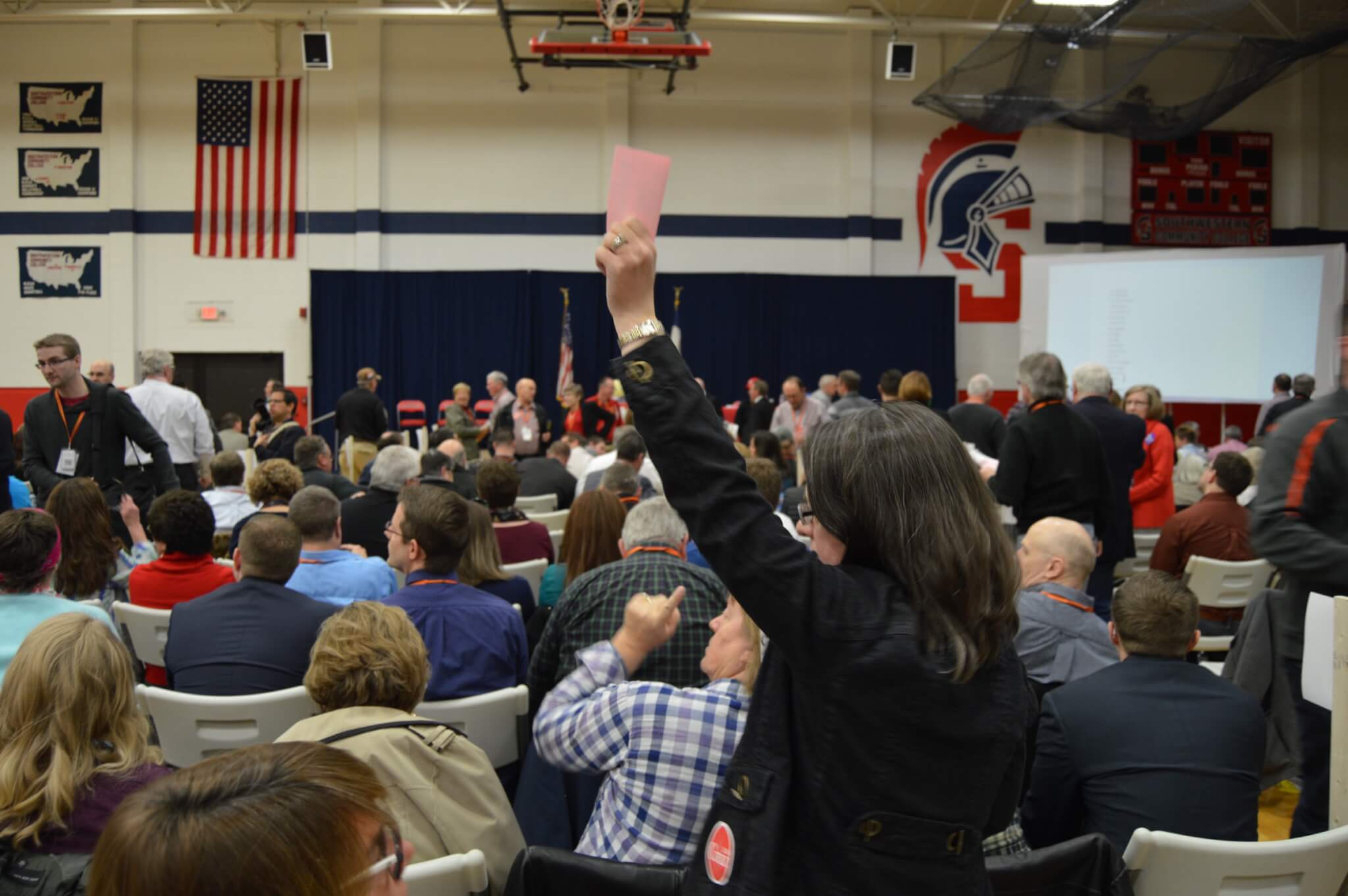
Each passing weekend Donald Trump’s chances of securing the Republican Party’s nomination slips further and further away. It’s on those Saturdays typically when party meetings convene to select individual people to serve as national delegates to Cleveland from the district and state level in many states. And Trump’s getting killed in that process.
The Trump campaign’s failure to organize for these delegate selections has undermined him plenty, but that doesn’t mean his point about an unfair process is completely unfounded. Sure, you can make fun of Trump for getting shut out in Colorado, but who on earth can defend the way Colorado Republicans chose their national delegates in the first place?
Republicans in this important swing state didn’t even get to vote! Or caucus! It was chosen by 8,000 party insiders and activists at a statewide convention. And the process to even get to that convention was convoluted and confusing.
And then there’s states like South Carolina, where Trump won every single delegate on the day of the primary, but is losing their loyalty in subsequent delegate elections. The delegates from South Carolina will be bound to vote for Trump on the first ballot, but can go wherever they want after that. Most selected so far at district conventions are Ted Cruz backers.
How is any of this fair? Donald Trump won South Carolina. Delegates from South Carolina may deliver the nomination to Ted Cruz.
Sure, if you’re a party insider or activist you can shake your head and say, “Well, those are the rules, they should have been better organized.” But think of it from a first-time voters’ perspective. They turned out to vote for a person in their primary or caucus, but their vote won’t be accurately reflected at a contested convention when it counts.
Take Iowa for instance. Republicans gathered for four separate district conventions this past weekend. Three national delegates were elected from each. Cruz’s backers put up slates of three candidates in each district. Nine of them won, and two other delegates ended up being Cruz supporters anyway.
Cruz swept the delegate contest because his operation was highly organized and Trump’s was not. But even had Trump put up stiffer competition, he still might have been shut out.
That’s because of the way Republicans choose their delegates. Every attendee at the district convention gets to vote for three people for the three delegate spots. So essentially all any candidate needs to do is have a majority of supporters in the room and you’ll win all three if you get them to vote together. That happened in the 3rd District, where two of Cruz’s three chosen candidates for delegate got over 50% on the first ballot. His third got in a few ballots later.
And since Republicans don’t break into preference groups on caucus night, the people who get elected as delegates to the county conventions and beyond may not proportionally reflect that precinct’s choice.
This isn’t in any way a criticism of the Cruz team’s efforts. They knew the rules and played by them to obtain an advantage. But the question is whether these should be the rules in the first place.
Compare it to how Iowa Democrats choose their delegates. Each preference group sticks together on their way on up through the county and district conventions, choosing the people to represent them as delegates. So the Clinton folks vote for their own delegates while the Sanders people vote for theirs. When their delegates get to the national convention, Sanders delegates are actually comprised of people who like and will support Sanders.
It was odd to see the Republicans’ district convention play out, where Cruz supporters basically chose the people who will represent Trump, Rubio, Carson, Bush and Fiorina delegates (which are bound on the first ballot). The Iowa Caucus for Republicans is essentially a winner-take-all state for the second ballot.
The issue, however, on the Democratic side is that if your delegates from caucus night don’t show up at county conventions and later, you can lose your projected national delegates. The amount of national delegates each candidate receives is fluid at each stage in the process – viability and realignments play out like they do on caucus night. Clinton lost a projected delegate from the county conventions in 2008, while Obama picked up ten – mostly from Edwards folks.
Basically, Iowa Republicans’ delegate selection method is more fair on the first ballot, while Iowa Democrats delegate plan is more fair for a second ballot and beyond. But the Republican’s second ballot situation is wildly unfair and completely undermines the voters’ choice on caucus night.
And yes, the electoral college system is even worse, but that doesn’t mean we shouldn’t work to make it better. Since the parties make the delegate rules, there’s much more flexibility for improvements in future years.
But they’ll still have to live with the consequences from this year. If Trump wins the majority of pledged delegates and popular vote, which he is certain to do, his supporters will have a valid complaint if he doesn’t win the nomination. Especially if it’s because Cruz supporters filled so many of Trump’s won delegates with his own loyalists.
Republicans can say all they want that that’s just how the rules work, but it will be cold comfort when Trump voters stay home in November out of frustration with an undemocratic process.
by Pat Rynard
Posted 4/12/16
Politics

Biden marks Earth Day by announcing $7 billion in solar grants
The Biden administration on Monday announced the recipients of its Solar For All Program, a $7 billion climate program that aims to lower energy...

6 terrifying things that could happen if the Comstock Act is used to target abortion
Does 1873 sound like a really, really long time ago? Well, that’s because it is—but if Republicans and far-right anti-abortion activists have their...
Local News

No more Kum & Go? New owner Maverik of Utah retiring famous brand
Will Kum & Go have come and gone by next year? One new report claims that's the plan by the store's new owners. The Iowa-based convenience store...

Here’s a recap of the biggest headlines Iowa celebs made In 2023
For these famous Iowans, 2023 was a year of controversy, career highlights, and full-circle moments. Here’s how 2023 went for the following Iowans:...





